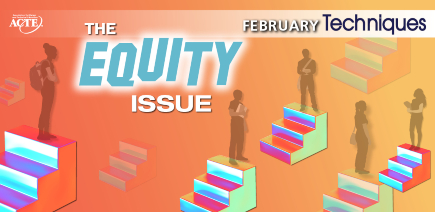Reaching every student to plan for life after high school in an urban school district can be a formidable assignment. But the educators at Fort Worth Independent School District (FWISD) go above and beyond to connect with as many students as possible. Their experiences have helped identify tools and strategies to, effectively and equitably, connect the district’s diverse population to high-wage, high-demand career pathways.
Although many of the district’s programs enroll high school students, career and technical education (CTE) begins in kindergarten. Students become attuned to their own learning styles, favorite subjects, goals and personalities. Simultaneously, teams of educators and students explore how to improve the world and what careers tie into students’ passions.
Finding passions >amp; setting goals
As a postsecondary success coordinator within the Department of Choice and Collegiate Programming at FWISD, I worked directly with counselors and postsecondary success specialists. And they, in turn, worked one on one with students. This team focuses on identifying and developing students’ talents, providing opportunities to find their passions, and offering the education that leads to fulfilling careers.
Fort Worth ISD takes a personalized approach to career development. This is due in large part to the diversity of the student population, 85% of whom are students of color. Nearly a third of students are bilingual or speak English as a second language. And an additional third are English learners. Because counselors start getting to know students’ interests and learning styles early, they are well positioned to help students plan and achieve their goals.
With more than 84,000 students in 82 elementary schools, 24 middle schools and sixth-grade centers, 21 high schools, and 16 other campuses, the district relies on strong community partnerships — especially when it comes to ensuring that students who need it the most receive extra support to set and reach goals. FWISD involves the community starting in pre-kindergarten, with collaborative efforts to register students and get them started on their educational journey. In 2018, FWISD reported 93% pre-K enrollment among eligible students, well above the state average of 76%.
Exploring careers
For middle and high-school students, self-knowledge is structured around a series of assessments that help students uncover their interests, aptitudes and aspirations. These assessments, from Xello, are divided into four areas:
- Career matchmaker interest inventory: Students answer questions about their interests and view career matches.
- Personality style assessment: Based on the Holland Codes, this assessment captures the situations and opportunities that motivate users. They gain insight into the work best suited to their characters and how their personalities align with different work environments.
- Learning style assessment: Students answer a series of questions to determine if they are auditory, tactile and/or visual learners.
- Skills lab assessment: Students indicate their preferences for using different skills to determine career suitability based on abilities and aptitudes.
Once the assessments are complete, students better understand how their interests connect with their career options. They can then apply these insights as they research careers, educational qualifications and postsecondary institutions that off er relevant programs.
Engaging the local community
Community engagement efforts at the high school level targets schools where students face the most challenges to readiness. The Tarrant To and Through Program (T3), founded in 2020, unites local school districts, colleges, universities and employers to improve outcomes in three primary areas:
- Graduating more students from high school who are ready for college, career and/or the military
- Helping more students enroll in a postsecondary pathway with confidence
- Empowering more students to persist and earn a degree or credential to enter the workforce prepared for a successful career
Further, T3 bolsters families’ roles in the planning journey, helping them better understand their children’s options and emphasizing how powerful their encouragement and influence on decision-making can be.
Developing postsecondary plans
In 2020–21, T3 worked with ninth- and 10th-grade students at three schools in Fort Worth ISD on their postsecondary plans. While developing these plans, students consider what they want to do in the future, and they begin to discover which pathways will help them achieve those goals.
We know that students reach high school already in possession of skills, knowledge, interests and experiences. For this reason, FWISD worked with Xello to develop custom lessons on postsecondary planning. The lessons ask students to:
- Reflect on their personal passions, strengths and career interests and review the options they are considering after high school.
- Reflect on their academic readiness and the financial aid options available to them.
- Identify an advisor they can rely on for support.
For the 2021–22 year, FWISD expanded T3 to include juniors and seniors. One-on-one and group advising and assistance through T3 are now available at 14 district schools. Participating students receive support in building customized plans for life after high school. And those who are eligible also receive scholarships to participating colleges and universities, along with additional program supports to help ensure they stay enrolled and graduate.
Beyond simply learning about the different pathways, students can select a pathway to pursue. And they will receive actionable next steps to help them meet their goals. These features ensure that every student can identify and work toward success along a career pathway.
Connecting the dots
Wherever students’ interests extend — from automotive to aviation or cybersecurity to culinary —they often know some of their own inclinations by middle school. FWISD’s college and career readiness coaches begin working with students in sixth grade. Students learn college terminology, explore careers, consider what colleges they may like to visit and much more. With seventh graders, the coaches concentrate on exploring career pathways of interest and discussing their high school options.
The goal is for students to feel like they are an equitable partner in working with educators and counselors to customize their experiences based on what they like to learn and do.
The district also encourages students to seek out community support. For example, on every secondary school campus, GO Centers offer safe spaces for students to do online research and talk to mentors from local higher education institutions. These GO Centers — which FWISD opened in 2004 — provide invaluable support for the students in Fort Worth’s majority minority district.
Achieving success
By the time FWISD students get to high school, they are closer to achieving career success. On a personal level, as a parent, I’ve seen how effective it is to start career exploration early. My own son is now a college student, majoring in business finance — which is exactly what his middle school career exploration tools indicated would be a good fit for him.
FWISD is proud of how many of its graduates are ready for careers and college. But its educators know that work remains to prepare every student. Its counseling teams work relentlessly to identify and connect with the students who need extra support. Additionally, they conduct regular reviews of districtwide data to understand what outreach has been most successful and to strategize on successes and challenges. This dual approach helps ensure that all students are engaged equitably and that all programs are accessible to every student.
Tonni Grant, Ed.D., formerly served as a postsecondary success coordinator within the Department of Choice and Collegiate Programming at Fort Worth Independent School District. Grant’s responsibilities included overseeing high school postsecondary success specialists; providing college, career and military readiness professional development; and supporting CTE coordinators and counselors in the implementation of academic planning.








